The Core of Success: Analyzing Qualities of Effective Leadership
VerifiedAdded on 2023/06/12
|6
|1430
|115
Essay
AI Summary
This essay examines the critical role of strong leaders at the core of successful organizations. It analyzes key qualities such as a clear and compelling vision, self-awareness, and the ability to motivate and inspire others. The essay highlights the importance of emotional intelligence, strategic thinking, and the capacity to drive innovation and change. Drawing on the insights of leadership experts like Jim Collins, Daniel Goleman, and John Maxwell, the essay argues that effective leaders possess a combination of personal humility, professional will, and a focus on both internal and external factors. Ultimately, the essay concludes that these leadership qualities are essential for fostering a competitive and thriving organizational environment. Desklib provides access to this essay along with a wide range of study tools and solved assignments for students.
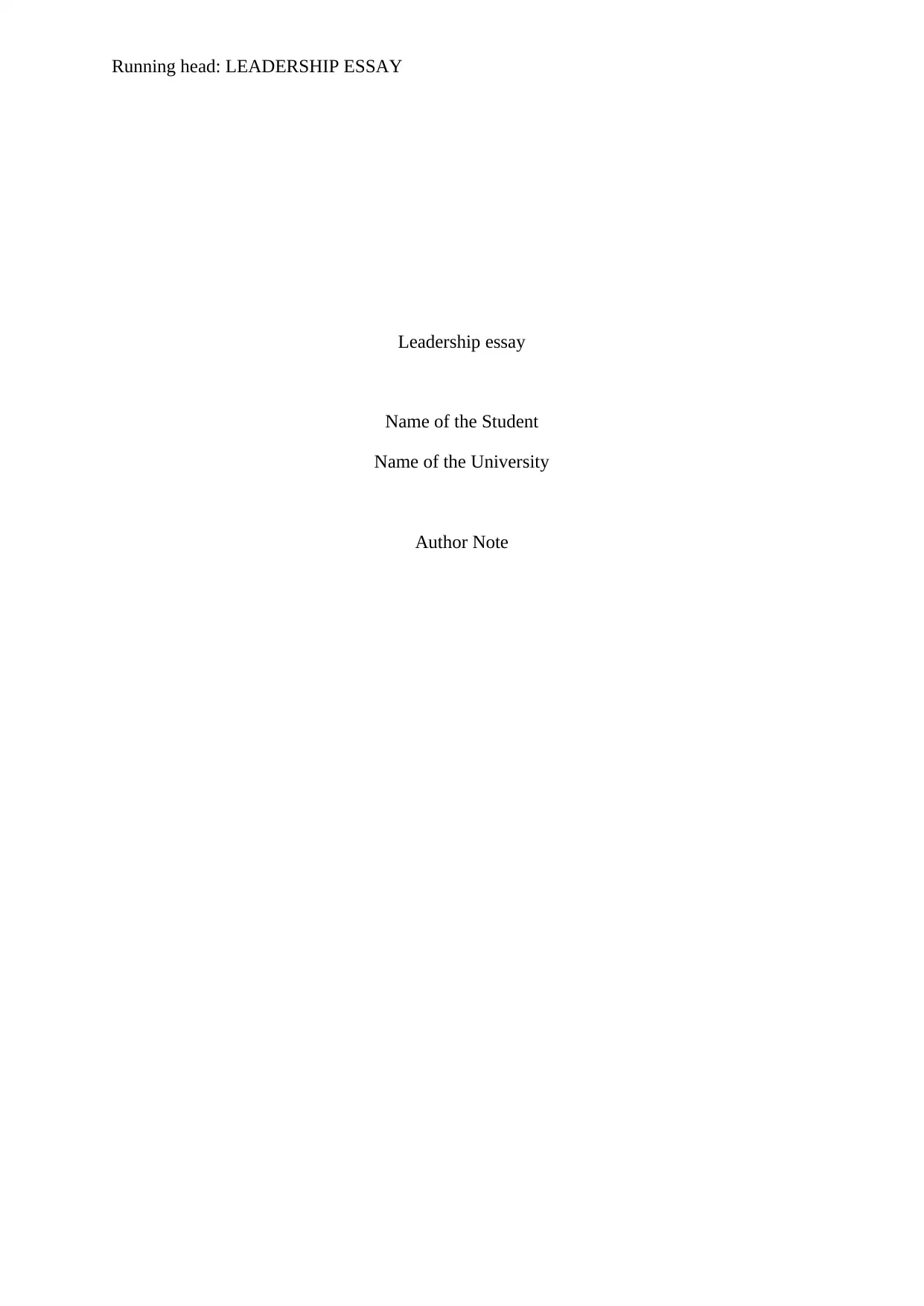
Running head: LEADERSHIP ESSAY
Leadership essay
Name of the Student
Name of the University
Author Note
Leadership essay
Name of the Student
Name of the University
Author Note
Paraphrase This Document
Need a fresh take? Get an instant paraphrase of this document with our AI Paraphraser
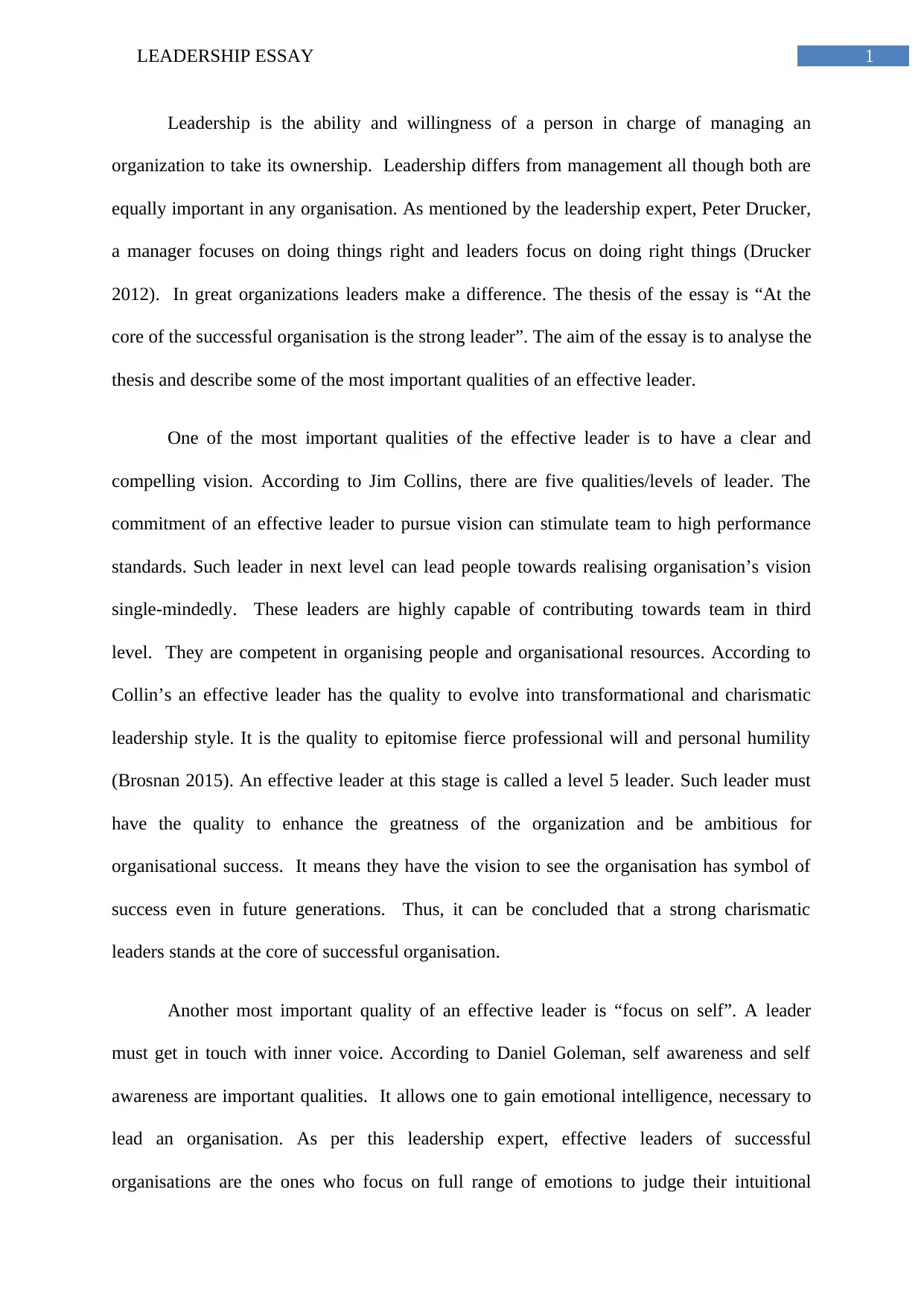
1LEADERSHIP ESSAY
Leadership is the ability and willingness of a person in charge of managing an
organization to take its ownership. Leadership differs from management all though both are
equally important in any organisation. As mentioned by the leadership expert, Peter Drucker,
a manager focuses on doing things right and leaders focus on doing right things (Drucker
2012). In great organizations leaders make a difference. The thesis of the essay is “At the
core of the successful organisation is the strong leader”. The aim of the essay is to analyse the
thesis and describe some of the most important qualities of an effective leader.
One of the most important qualities of the effective leader is to have a clear and
compelling vision. According to Jim Collins, there are five qualities/levels of leader. The
commitment of an effective leader to pursue vision can stimulate team to high performance
standards. Such leader in next level can lead people towards realising organisation’s vision
single-mindedly. These leaders are highly capable of contributing towards team in third
level. They are competent in organising people and organisational resources. According to
Collin’s an effective leader has the quality to evolve into transformational and charismatic
leadership style. It is the quality to epitomise fierce professional will and personal humility
(Brosnan 2015). An effective leader at this stage is called a level 5 leader. Such leader must
have the quality to enhance the greatness of the organization and be ambitious for
organisational success. It means they have the vision to see the organisation has symbol of
success even in future generations. Thus, it can be concluded that a strong charismatic
leaders stands at the core of successful organisation.
Another most important quality of an effective leader is “focus on self”. A leader
must get in touch with inner voice. According to Daniel Goleman, self awareness and self
awareness are important qualities. It allows one to gain emotional intelligence, necessary to
lead an organisation. As per this leadership expert, effective leaders of successful
organisations are the ones who focus on full range of emotions to judge their intuitional
Leadership is the ability and willingness of a person in charge of managing an
organization to take its ownership. Leadership differs from management all though both are
equally important in any organisation. As mentioned by the leadership expert, Peter Drucker,
a manager focuses on doing things right and leaders focus on doing right things (Drucker
2012). In great organizations leaders make a difference. The thesis of the essay is “At the
core of the successful organisation is the strong leader”. The aim of the essay is to analyse the
thesis and describe some of the most important qualities of an effective leader.
One of the most important qualities of the effective leader is to have a clear and
compelling vision. According to Jim Collins, there are five qualities/levels of leader. The
commitment of an effective leader to pursue vision can stimulate team to high performance
standards. Such leader in next level can lead people towards realising organisation’s vision
single-mindedly. These leaders are highly capable of contributing towards team in third
level. They are competent in organising people and organisational resources. According to
Collin’s an effective leader has the quality to evolve into transformational and charismatic
leadership style. It is the quality to epitomise fierce professional will and personal humility
(Brosnan 2015). An effective leader at this stage is called a level 5 leader. Such leader must
have the quality to enhance the greatness of the organization and be ambitious for
organisational success. It means they have the vision to see the organisation has symbol of
success even in future generations. Thus, it can be concluded that a strong charismatic
leaders stands at the core of successful organisation.
Another most important quality of an effective leader is “focus on self”. A leader
must get in touch with inner voice. According to Daniel Goleman, self awareness and self
awareness are important qualities. It allows one to gain emotional intelligence, necessary to
lead an organisation. As per this leadership expert, effective leaders of successful
organisations are the ones who focus on full range of emotions to judge their intuitional
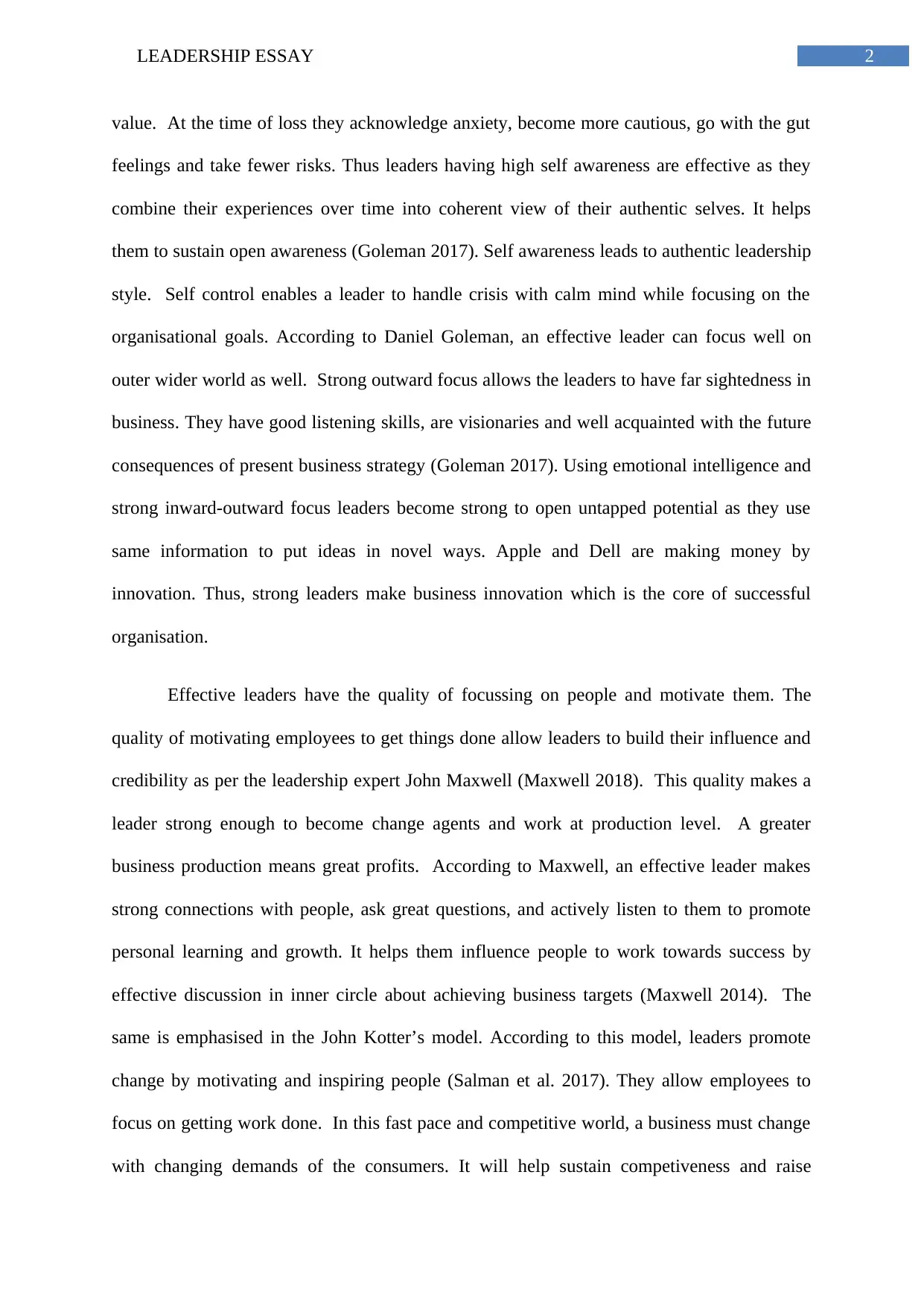
2LEADERSHIP ESSAY
value. At the time of loss they acknowledge anxiety, become more cautious, go with the gut
feelings and take fewer risks. Thus leaders having high self awareness are effective as they
combine their experiences over time into coherent view of their authentic selves. It helps
them to sustain open awareness (Goleman 2017). Self awareness leads to authentic leadership
style. Self control enables a leader to handle crisis with calm mind while focusing on the
organisational goals. According to Daniel Goleman, an effective leader can focus well on
outer wider world as well. Strong outward focus allows the leaders to have far sightedness in
business. They have good listening skills, are visionaries and well acquainted with the future
consequences of present business strategy (Goleman 2017). Using emotional intelligence and
strong inward-outward focus leaders become strong to open untapped potential as they use
same information to put ideas in novel ways. Apple and Dell are making money by
innovation. Thus, strong leaders make business innovation which is the core of successful
organisation.
Effective leaders have the quality of focussing on people and motivate them. The
quality of motivating employees to get things done allow leaders to build their influence and
credibility as per the leadership expert John Maxwell (Maxwell 2018). This quality makes a
leader strong enough to become change agents and work at production level. A greater
business production means great profits. According to Maxwell, an effective leader makes
strong connections with people, ask great questions, and actively listen to them to promote
personal learning and growth. It helps them influence people to work towards success by
effective discussion in inner circle about achieving business targets (Maxwell 2014). The
same is emphasised in the John Kotter’s model. According to this model, leaders promote
change by motivating and inspiring people (Salman et al. 2017). They allow employees to
focus on getting work done. In this fast pace and competitive world, a business must change
with changing demands of the consumers. It will help sustain competiveness and raise
value. At the time of loss they acknowledge anxiety, become more cautious, go with the gut
feelings and take fewer risks. Thus leaders having high self awareness are effective as they
combine their experiences over time into coherent view of their authentic selves. It helps
them to sustain open awareness (Goleman 2017). Self awareness leads to authentic leadership
style. Self control enables a leader to handle crisis with calm mind while focusing on the
organisational goals. According to Daniel Goleman, an effective leader can focus well on
outer wider world as well. Strong outward focus allows the leaders to have far sightedness in
business. They have good listening skills, are visionaries and well acquainted with the future
consequences of present business strategy (Goleman 2017). Using emotional intelligence and
strong inward-outward focus leaders become strong to open untapped potential as they use
same information to put ideas in novel ways. Apple and Dell are making money by
innovation. Thus, strong leaders make business innovation which is the core of successful
organisation.
Effective leaders have the quality of focussing on people and motivate them. The
quality of motivating employees to get things done allow leaders to build their influence and
credibility as per the leadership expert John Maxwell (Maxwell 2018). This quality makes a
leader strong enough to become change agents and work at production level. A greater
business production means great profits. According to Maxwell, an effective leader makes
strong connections with people, ask great questions, and actively listen to them to promote
personal learning and growth. It helps them influence people to work towards success by
effective discussion in inner circle about achieving business targets (Maxwell 2014). The
same is emphasised in the John Kotter’s model. According to this model, leaders promote
change by motivating and inspiring people (Salman et al. 2017). They allow employees to
focus on getting work done. In this fast pace and competitive world, a business must change
with changing demands of the consumers. It will help sustain competiveness and raise
⊘ This is a preview!⊘
Do you want full access?
Subscribe today to unlock all pages.

Trusted by 1+ million students worldwide
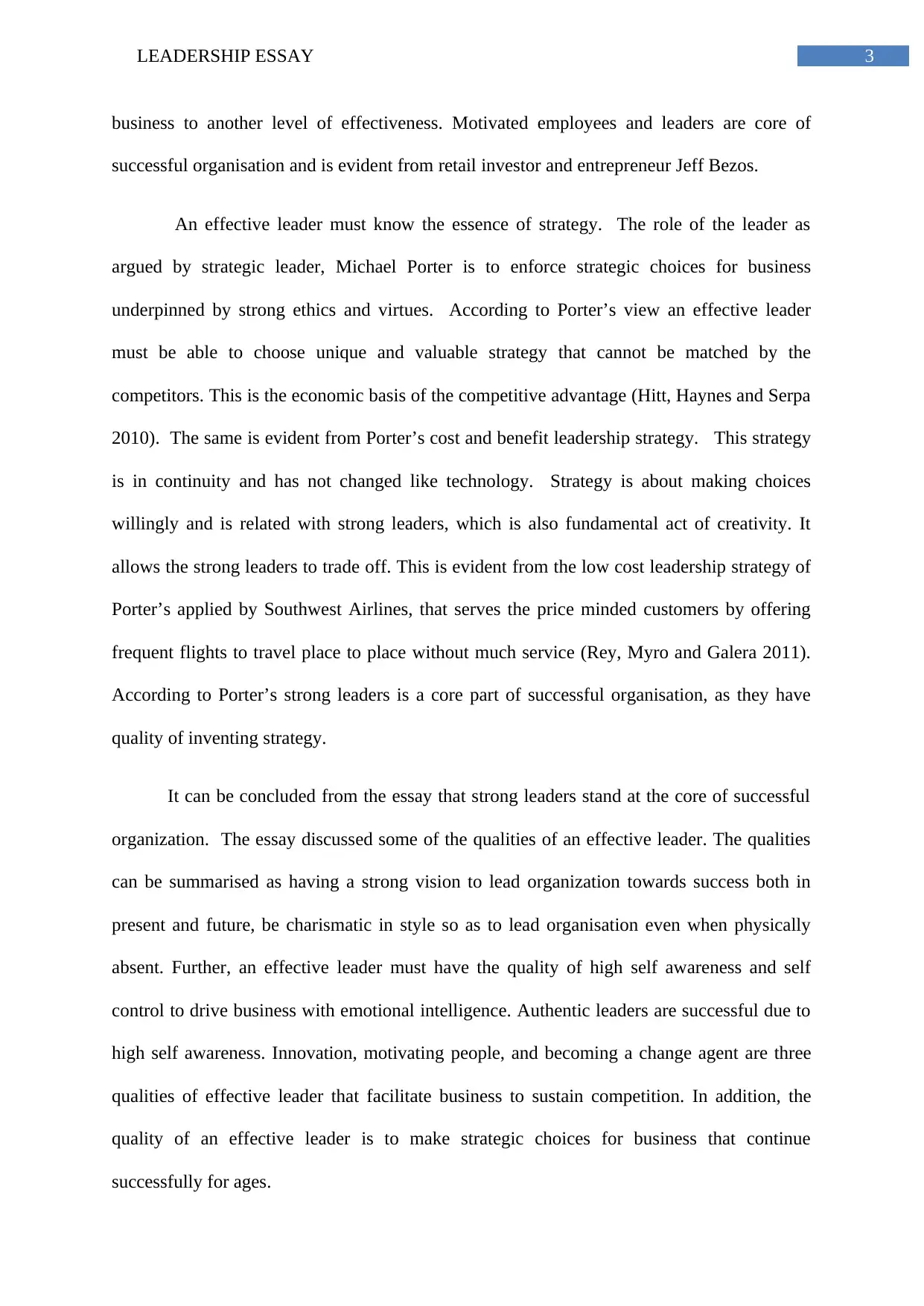
3LEADERSHIP ESSAY
business to another level of effectiveness. Motivated employees and leaders are core of
successful organisation and is evident from retail investor and entrepreneur Jeff Bezos.
An effective leader must know the essence of strategy. The role of the leader as
argued by strategic leader, Michael Porter is to enforce strategic choices for business
underpinned by strong ethics and virtues. According to Porter’s view an effective leader
must be able to choose unique and valuable strategy that cannot be matched by the
competitors. This is the economic basis of the competitive advantage (Hitt, Haynes and Serpa
2010). The same is evident from Porter’s cost and benefit leadership strategy. This strategy
is in continuity and has not changed like technology. Strategy is about making choices
willingly and is related with strong leaders, which is also fundamental act of creativity. It
allows the strong leaders to trade off. This is evident from the low cost leadership strategy of
Porter’s applied by Southwest Airlines, that serves the price minded customers by offering
frequent flights to travel place to place without much service (Rey, Myro and Galera 2011).
According to Porter’s strong leaders is a core part of successful organisation, as they have
quality of inventing strategy.
It can be concluded from the essay that strong leaders stand at the core of successful
organization. The essay discussed some of the qualities of an effective leader. The qualities
can be summarised as having a strong vision to lead organization towards success both in
present and future, be charismatic in style so as to lead organisation even when physically
absent. Further, an effective leader must have the quality of high self awareness and self
control to drive business with emotional intelligence. Authentic leaders are successful due to
high self awareness. Innovation, motivating people, and becoming a change agent are three
qualities of effective leader that facilitate business to sustain competition. In addition, the
quality of an effective leader is to make strategic choices for business that continue
successfully for ages.
business to another level of effectiveness. Motivated employees and leaders are core of
successful organisation and is evident from retail investor and entrepreneur Jeff Bezos.
An effective leader must know the essence of strategy. The role of the leader as
argued by strategic leader, Michael Porter is to enforce strategic choices for business
underpinned by strong ethics and virtues. According to Porter’s view an effective leader
must be able to choose unique and valuable strategy that cannot be matched by the
competitors. This is the economic basis of the competitive advantage (Hitt, Haynes and Serpa
2010). The same is evident from Porter’s cost and benefit leadership strategy. This strategy
is in continuity and has not changed like technology. Strategy is about making choices
willingly and is related with strong leaders, which is also fundamental act of creativity. It
allows the strong leaders to trade off. This is evident from the low cost leadership strategy of
Porter’s applied by Southwest Airlines, that serves the price minded customers by offering
frequent flights to travel place to place without much service (Rey, Myro and Galera 2011).
According to Porter’s strong leaders is a core part of successful organisation, as they have
quality of inventing strategy.
It can be concluded from the essay that strong leaders stand at the core of successful
organization. The essay discussed some of the qualities of an effective leader. The qualities
can be summarised as having a strong vision to lead organization towards success both in
present and future, be charismatic in style so as to lead organisation even when physically
absent. Further, an effective leader must have the quality of high self awareness and self
control to drive business with emotional intelligence. Authentic leaders are successful due to
high self awareness. Innovation, motivating people, and becoming a change agent are three
qualities of effective leader that facilitate business to sustain competition. In addition, the
quality of an effective leader is to make strategic choices for business that continue
successfully for ages.
Paraphrase This Document
Need a fresh take? Get an instant paraphrase of this document with our AI Paraphraser
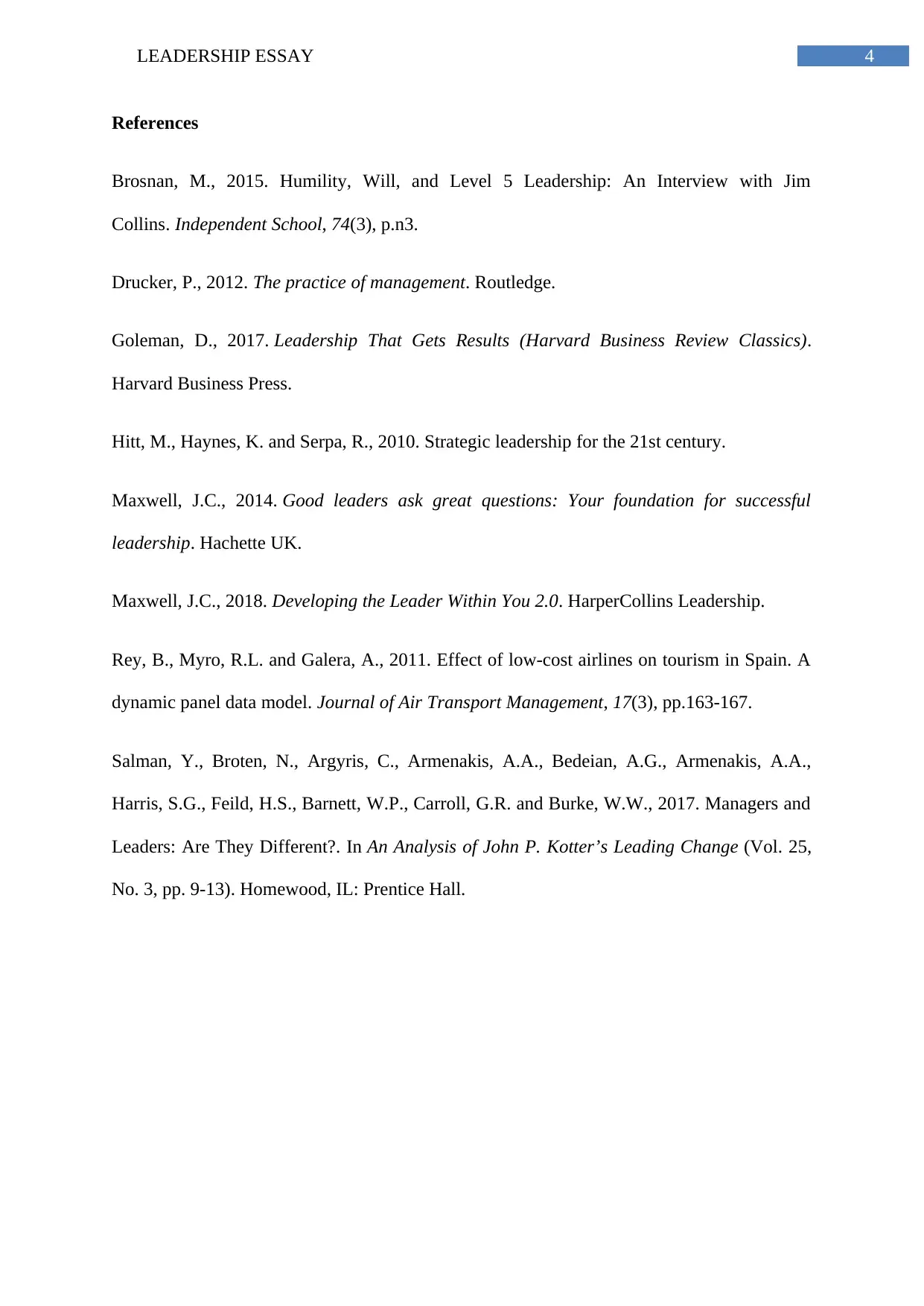
4LEADERSHIP ESSAY
References
Brosnan, M., 2015. Humility, Will, and Level 5 Leadership: An Interview with Jim
Collins. Independent School, 74(3), p.n3.
Drucker, P., 2012. The practice of management. Routledge.
Goleman, D., 2017. Leadership That Gets Results (Harvard Business Review Classics).
Harvard Business Press.
Hitt, M., Haynes, K. and Serpa, R., 2010. Strategic leadership for the 21st century.
Maxwell, J.C., 2014. Good leaders ask great questions: Your foundation for successful
leadership. Hachette UK.
Maxwell, J.C., 2018. Developing the Leader Within You 2.0. HarperCollins Leadership.
Rey, B., Myro, R.L. and Galera, A., 2011. Effect of low-cost airlines on tourism in Spain. A
dynamic panel data model. Journal of Air Transport Management, 17(3), pp.163-167.
Salman, Y., Broten, N., Argyris, C., Armenakis, A.A., Bedeian, A.G., Armenakis, A.A.,
Harris, S.G., Feild, H.S., Barnett, W.P., Carroll, G.R. and Burke, W.W., 2017. Managers and
Leaders: Are They Different?. In An Analysis of John P. Kotter’s Leading Change (Vol. 25,
No. 3, pp. 9-13). Homewood, IL: Prentice Hall.
References
Brosnan, M., 2015. Humility, Will, and Level 5 Leadership: An Interview with Jim
Collins. Independent School, 74(3), p.n3.
Drucker, P., 2012. The practice of management. Routledge.
Goleman, D., 2017. Leadership That Gets Results (Harvard Business Review Classics).
Harvard Business Press.
Hitt, M., Haynes, K. and Serpa, R., 2010. Strategic leadership for the 21st century.
Maxwell, J.C., 2014. Good leaders ask great questions: Your foundation for successful
leadership. Hachette UK.
Maxwell, J.C., 2018. Developing the Leader Within You 2.0. HarperCollins Leadership.
Rey, B., Myro, R.L. and Galera, A., 2011. Effect of low-cost airlines on tourism in Spain. A
dynamic panel data model. Journal of Air Transport Management, 17(3), pp.163-167.
Salman, Y., Broten, N., Argyris, C., Armenakis, A.A., Bedeian, A.G., Armenakis, A.A.,
Harris, S.G., Feild, H.S., Barnett, W.P., Carroll, G.R. and Burke, W.W., 2017. Managers and
Leaders: Are They Different?. In An Analysis of John P. Kotter’s Leading Change (Vol. 25,
No. 3, pp. 9-13). Homewood, IL: Prentice Hall.

5LEADERSHIP ESSAY
⊘ This is a preview!⊘
Do you want full access?
Subscribe today to unlock all pages.

Trusted by 1+ million students worldwide
1 out of 6
Related Documents
Your All-in-One AI-Powered Toolkit for Academic Success.
+13062052269
info@desklib.com
Available 24*7 on WhatsApp / Email
![[object Object]](/_next/static/media/star-bottom.7253800d.svg)
Unlock your academic potential
Copyright © 2020–2026 A2Z Services. All Rights Reserved. Developed and managed by ZUCOL.





